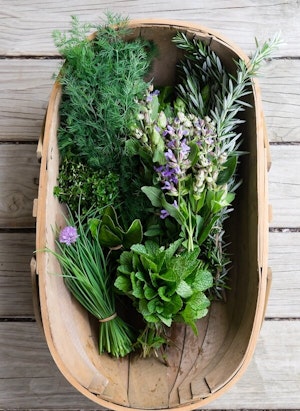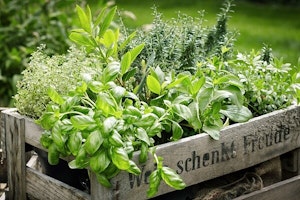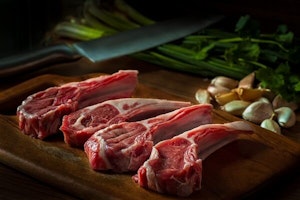 Be Inspired Blog - Arizona
Be Inspired Blog - Arizona

Make Fantastic Marinades With Your Fresh-Picked Herbs
Herbs from your home garden can serve many purposes in the kitchen. From teas to seasonings to herb-based marinades, they can add custom touches to your home cuisine on a sustainable basis. In recent years, even restaurants have started keeping their own herb gardens on site to cut ingredient costs while improving sourcing and quality.
One of the most exciting uses for homegrown herbs is making herb-based marinades for entree items, like meat and seafood dishes. It’s an opportunity to harvest from your garden, dig deeper into your pantry or crisper and harmonize dishes with different flavor palettes. Show off the fruits of your garden in ways even the most dedicated meat-eater can appreciate using our how-to guide and list of recipes.
Components of Herb-based Marinades
There are two basic types of marinades: oil-based and water- or solvent-based. Chemicals in plants used for ground spices such as cayenne and black pepper tend to dissolve more easily into oil than water, according to UCLA's Science and Food blog. In contrast, leafy herbs contain more flavor chemicals that mix better with water-based substances, like vinegars and broth stocks
 Acidic water-based solvents like wine or citrus juice pull flavor from herbs, allowing meat or vegetables soaking in the mixture to absorb herbs without the assistance of heat. Extremely salty compounds, such as brines or high-sodium sauces, have a similar effect. Although herb-based marinades come in infinite varieties, they have the same basic components:
Acidic water-based solvents like wine or citrus juice pull flavor from herbs, allowing meat or vegetables soaking in the mixture to absorb herbs without the assistance of heat. Extremely salty compounds, such as brines or high-sodium sauces, have a similar effect. Although herb-based marinades come in infinite varieties, they have the same basic components:
- Fresh herbs
- Liquid base, usually a diluted acid
- Fresh additives, like fruits or vegetables
- Dry ingredients, like spices and salt
Some herb-based marinades combine oils, sugars and acidic bases to alter a recipe’s consistency or to capture a different range of flavor compounds. Ingredients like sesame oil or honey in a citrus-based marinade are not particularly uncommon in more complex recipes.
Best Plants to Grow in Your Garden for Herb-based Marinades

Garlic
Used in nearly every cuisine worldwide, this versatile plant is both an herb and a spice. According to SFGate, growing from seed bulbs renders the best results, although leftover cloves from the grocery store can easily be planted as well. Garlic prefers full sun and well-drained soil as well as an autumn planting but can be brought inside for year-round cultivation. It’s the cornerstone ingredient in several herb-based marinades.
Chives
A close relative of the onion, chives impart a ‘greener’ flavor than other species in their family. Both non-flowering (sterile) and flowering varieties are widely available as starts at farmers markets and garden retailers. Usually sprouting in April, chives prefer full sun and moist soils. For best results, plant early in the spring - just after the final frost of the year, according to the Old Farmer’s Almanac.
Fennel
Fennel originated in southern Europe, eventually making its way into Asian cuisine via medieval trade routes. Its seeds and leafy fronds produce a sweet, licorice-like flavor that hints at its close relationship with dill and caraway. Fennel is an unusual but fragrant addition to herb-based marinades. Sowing from seed is preferable to bulb cultivation, although fennel does develop bulbs. Full sun and moist, well-draining soil allows fennel to develop dense stands with showy flowers that return each spring season.

Ginger
This Asian seasoning is now used throughout the world in both sweet and savory dishes. Despite its strong flavor it is incredibly versatile. It also grows well in a variety of climates, provided they are warm during a good part of the year. Ginger prefers partial shade and moderate watering in soils that hold moisture well, according to the East Valley Tribune in Phoenix. Harvest the root, or rhizome, regularly and place a piece back in the soil to re-cultivate.
Tarragon
Tarragon is a perennial with origins in southwestern Europe, used most often in Spanish and French cuisine. It imparts a more delicate flavor in herb-based marinades than fennel or basil, though it shares many of the same aromatic compounds. To add it to your garden, introduce established starts to an area of your yard with loose soil and partial sunlight, according to Garden Know-how. After harvesting its grass-like leaves, you can dry them in an oven by heating it to its lowest setting (usually between 140 and 200 degrees,) and turning it off. Lay the plants flat on a cooling rack sitting on a sheet tray to allow air to circulate around them. Check after 20 minutes until fully dry and be sure to store them in a cool, dark place to preserve their flavor.
Spearmint
Hardy, versatile and delicious, this member of the mint family has added a refreshing touch to sweet, savory and spicy dishes from north Africa to central Asia for millennia. It thrives best in partial shade and moist soils but can withstand seasonal fluctuations with incredible resilience. A simple transplant from a friend’s garden with an intact root is often enough to allow spearmint to establish itself in any yard. Mint is an aggressive grower, so it is wise to confine it to a container. Starts must be kept well-watered to get the most out of this prolific plant

Basil
This Mediterranean favorite grows well in warm, sunny environments with well-drained soils that retain some day-to-day moisture from moderate watering sessions. With the right conditions, basil thrives through the warm season of the Southwestern U.S. It is however more delicate to harvest than other Mediterranean perennials and requires careful treatment. Today’s Homeowner advises harvesting leaves from the top down. Take care to leave enough green surface area for the plant to take in the sunlight it needs to survive. Chiffonade basil leaves to add a fresh, fragrant punch to herb-based marinades.
Sage
The strong flavor profile and rough foliage of the sage plant make it resistant to drought, disease and predation. In moderation, these characteristics can make a so-so meal into something truly special. After purchasing your sage start from one of our valley locations, install it in sandy, slightly acidic soil and be sure not to over water. Place in full sun and watch it thrive in all it’s gray, green and purple glory!

Cilantro
Though easily grown from seeds or seedlings, adult cilantro plants need extra love and care to stay productive. It grows quickly in full sun but needs frequent watering. It enjoys well-drained soils but needs continuous moisture. Partial sun and frequent harvest can prevent cilantro from bolting, which will result in reduced leaf production and flavor availability. For year-round harvesting, Burpee Seed Catalogue recommends re-sowing seeds every two to three weeks. Follow these guidelines and you can use freshly picked, finely chopped leaves in your herb-based marinades all year long.
Garden Fruit and Vegetables for Herb-based Marinades
These plants grow well in Arizona’s arid climate and can add fresh flavor dimensions to your herb-based marinades, as well as beauty and variety to your garden.
- Citrus: pick the acid element of a marinade from a tree right in your yard
- Peppers: fresh peppers are preferable to dry spices and cook nicely under the same conditions as most meats
- Sweet corn: corn can add natural sugar to an herb-based marinade, brightening an otherwise sour or acidic recipe
- Pinyon: pine nuts can come from a range of trees in the pine family, but pinyons are among those best-suited to desert or mountainous climates, according to naturalist chef Hank Shaw
See the recipes below for ways to incorporate these garden plants into your herb-based marinades.
Garden-to-Table: Herb-based Marinades for Meats and Seafood

Sweet Herbed Ceviche
(our take on this Latin American dish)
- 1 pound lean whitefish
- 3 limes, juiced
- 2 lemons, juiced
- 1 grapefruit, juiced (optional)
- 3 tablespoons cilantro, chopped
- 2 ears fresh sweet corn, shucked
- 1.5 tablespoon chives, chopped
Marinade time: 30 minutes-2 hours depending on preference
Lemon-ginger Salmon
(our spin on this Northwest-Asian fusion favorite)
- 1 pound salmon fillet, skin-on
- 2 lemons, juiced
- 2-4 cloves garlic, grated
- 2 teaspoons fresh ginger, peeled & grated
- 1 teaspoon Thai chili, blended into paste
- 3 tablespoons sesame or olive oil
- 1 teaspoon sea salt or soy sauce
Marinade time: 2 hours to overnight

Wild Lamb
(our version of this stewed lamb recipe)
- 2 pounds lamb stew meat
- 1.5 cups wine of your choice (dry red recommended)
- 4 cloves garlic, minced or grated
- 10 fresh juniper berries, finely processed
- 1/2 cups fresh fennel tops, minced
- 2 tablespoons fresh sage, chopped
- 1-2 teaspoons freshly ground pepper
- 3 teaspoons salt
- water sufficient to fill container
Marinade time: 3 hours to overnight
Pesto-marinated Chicken
(our version of this Italian-inspired recipe)
- 1.5 pounds chicken breast, boneless & skinless
- 1/2 cup white wine vinegar
- 1 lemon, juiced
- 6-8 cloves garlic, grated
- 2 cups fresh basil, minced
- 2 cups pine nuts, finely processed
- 2 teaspoons black pepper
- 2 teaspoons Kosher or sea salt
- Olive oil sufficient to cover meat
Marinade time: 4-6 hours

Mediterranean-marinated Steak
(a more garden-friendly twist on this recipe)
- 2 pounds flank steak
- 1/2 cup red wine vinegar
- 1 lemon, juiced & zested
- 2-4 garlic green tops, minced
- 1/2 cup fresh tarragon, minced
- 1/2 cup fresh mint, minced
- 1/4 cup soy sauce, fish sauce or coconut aminos
Marinade time: 8-24 hours
Whiskeyed Pork Ribs
(an herbier take on this quintessentially American recipe)
- 6 pork ribs, trimmed of fat
- 1/2 cup bourbon whiskey
- 2 lemons, juiced
- 1/2 cup fresh chives, minced
- 1 tablespoon fresh ginger, peeled and minced
- 1 tablespoon black pepper
- 2 tablespoons sea salt
- 1/4 cup dark honey or brown sugar
Marinade time: 4 hours to overnight
Ask The Experts At SummerWinds
As the early growing season comes to a close, right now is the last chance to establish many of these warmth-loving species in your garden.
For advice on herb varieties, their culinary uses, and preserving garden vegetables, stop by any one of our convenient valley locations to talk with one of our Trusted Garden Advisors.
About SummerWinds Nursery: SummerWinds Garden Centers is a leading high-end retailer of garden and nursery products. Headquartered in Boise, Idaho, SummerWinds operates retail nurseries in the greater Phoenix, Arizona area, and in Silicon Valley, California, making it one of the largest independent retail nursery companies in the west. SummerWinds appeals to both the serious and casual gardeners, with a broad selection of premium gardening products and a friendly and knowledgeable staff.

